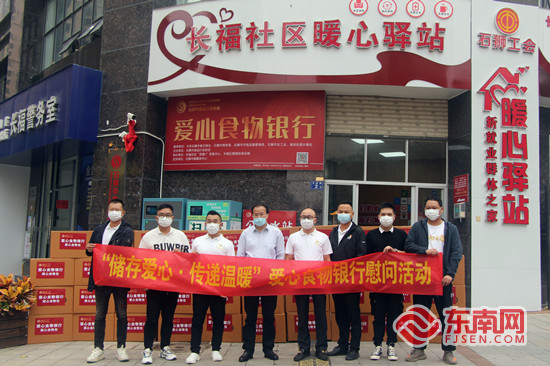- About
- Sustainability
Turning Expiry into Empathy: Quanzhou Opens Its First "Love Food Bank"
"This place not only offers a place to rest but also provides free food and water. It's wonderful!" said 58-year-old sanitation worker Ms. Zeng as she picked up a bottle of mineral water and a bag of bread during a break.
Launched on October 16, the initiative was led by the Shishi Food Industry Association in collaboration with the Changfu Community. Within two days, it has already served more than 100 sanitation workers, delivery riders, and other outdoor labourers.



Transforming Rest Stations into Community Food Hubs
Located in Changfu Community, the "Love Food Bank" was created by upgrading an existing outdoor rest stop into a 20-square-metre community service station. The space is equipped with chairs, a refrigerator, and air conditioning. Most importantly, it now features a "Cherished Food Sharing Shelf" stocked with individually packaged items such as bread, potato chips, biscuits, bottled water, and juice.
According to Mr. Dai Tianjiang, Director of the Changfu Community Residents' Committee, the concept is simple: the Shishi Food Industry Association collects near-expiry (but still safe) food donations from local companies and delivers them to the community. The community then stores and distributes the items free of charge to those in need—primarily outdoor workers.
Each item is clearly labelled with its expiry date. Most donations are 1 to 3 months from their expiry, though some exceed six months. The organisers ensure that anything within one week of expiry is removed from shelves, maintaining both safety and dignity for recipients.
Food, Water, and Dignity for Outdoor Workers
During just one hour of a recent visit, over 20 outdoor workers stopped by to receive food or drinks. "It's a heartwarming initiative," said Mr. Cai, a food delivery rider, who gratefully accepted a bottle of water and a box of cookies. "It's tough out there. This saves me money and makes me feel seen."
Mr. Liu, a security guard originally from Jiangxi, echoed the sentiment: "Don't worry, I'll eat these today. Nothing will go to waste." He chose juice and bread.
The project also includes a free hydration station offering bottled water and hot tea for frontline personnel like traffic police, sanitation workers, and couriers. Additionally, the Food Bank offers special "care packages"—curated gift bundles funded by corporate donations—that are distributed to low-income families. So far, five families in the community have received these support packages.
Reducing Waste, Feeding Kindness
To understand the project's roots, the Quanzhou Evening News interviewed Mr. Wu Zhiqiang, Executive President of the Shishi Food Industry Association. He explained that food manufacturers often face surplus inventory nearing expiry. Inspired by similar efforts elsewhere, the Association proposed the "Love Food Bank" concept in May.
"Our goal is to transform near-expiry items from potential waste into charitable resources," said Mr. Wu. After consulting with member companies, the idea gained traction. So far, 29 companies have contributed goods or monetary donations, with materials valued at over ¥48,000 (approx. USD $6,600).
Strict quality control is a key part of the initiative. The Association conducts eligibility checks on all donor companies, and each item's type, quantity, and expiry date is recorded. Donations are only accepted if products have at least one month of shelf life remaining.
Local authorities have praised the project while advising on safety standards. "This is a promising model," said a representative from the Shishi Market Supervision Bureau. "But food safety must be the top priority. Having dedicated staff to manage inventory and ensure items are distributed promptly is essential."
A Replicable Model of Food Sharing and Community Care
The "Love Food Bank" offers a compassionate, sustainable approach to reducing food waste while supporting vulnerable workers and families. Its success in Quanzhou may serve as a replicable model for other cities across China—and beyond.
— By Yang Yonghong, Quanzhou Evening News
